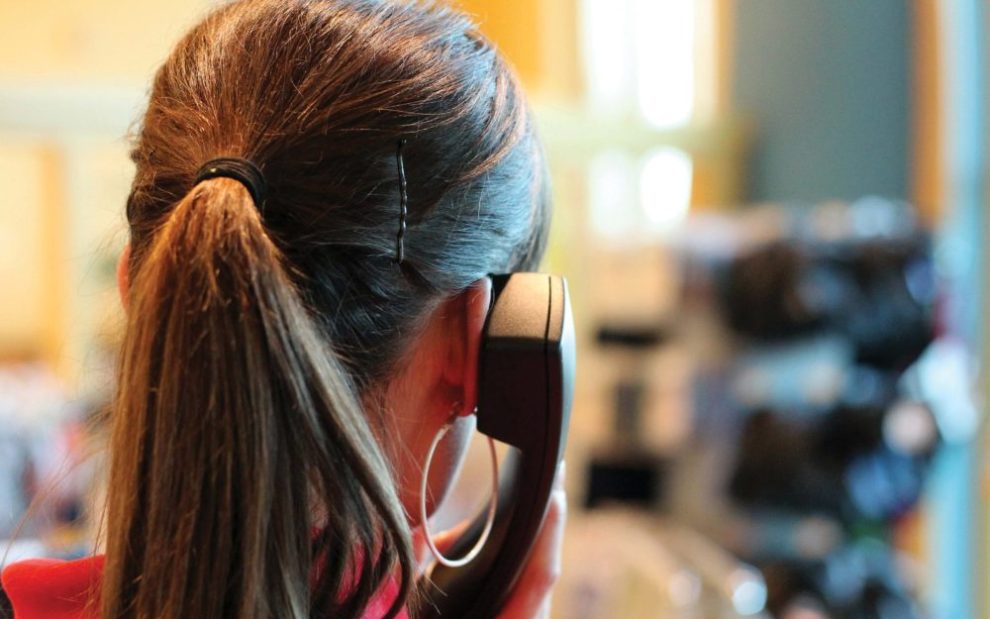When I was in college, I was late to the game in applying for campus work study positions, so I got stuck working in the fundraising call room. While I hated every moment of my weekly shifts spent phoning alumni and asking them to donate to the school, I learned a valuable lesson in how to treat people who have the unfortunate job of making unwanted phone calls. Be kind and respectful no matter what, because that person on the other end of the line is likely no happier to be asking for your time and money than you are to be giving it. They are just doing what they have to do to get by.
Working in a call room taught me how to be a better receiver of phone calls. Now, over a decade later, working as a director of faith formation at a parish is teaching me how to be a better parent through a similar process of placing me on the receiving end of a spectrum of parental attitudes and actions.
I used to only half-jokingly say that the least savory aspect of my job in faith formation was deciding whether to cancel Sunday morning religious education classes on days with inclement weather. I guess the universe wanted to give me a dose of exposure therapy because my past year has been spent making much more difficult decisions on whether to host youth gatherings online or in person and, in the event of the latter, what requirements to make regarding masks and vaccinations. With the complicated nature of these choices, I’ll be the first to admit that the “right decision” never feels clear. I work with our parish’s pastor, staff, and pastoral council to weigh the signs of the times, the pros and cons of various paths, and the current circumstances in our town and state. Together, we make a choice that will inevitably be appreciated by some and disdained by others.
On days when I’m feeling exceptionally optimistic and resilient, I feel grateful for the opportunity to witness the reactions of parents and to learn from them. Let me give you an idea of the lessons I’m learning by offering a few examples of responses that I received to an email laying out our parish’s decision, reasoning, and next steps related to hosting an in-person retreat for middle school and high school students.
One parent immediately responds to my message with several questions that would have been clearly answered if she had taken time to read my entire email. This message reminds me how insulting it is to be treated like your time is less valuable than someone else’s. I decide that, however many emails I might receive from educators, coaches, and troop leaders in my future as a parent, I will read them carefully knowing that time and thought went into them. I’ll only ask for clarification once I am sure that it hasn’t yet been provided.
Another parent sends me an email thanking me for putting so much thought into providing a safe and hospitable environment for all students. Her email makes me teary as I realize how good it feels to be affirmed. I make a commitment to be generous with my words of thanks to all of my children’s future educators and caregivers.
A different parent tells me that her husband will be calling the pastor to discuss the policy. With this “I want to talk to the manager” mentality, she undermines my authority and reminds me how much it hurts to be dismissed as a leader because of my place in the hierarchy. This experience warns me never to overlook the people who spend long hours working with my children, whatever their place.
Do we realize the extent to which who we are as parents doesn’t just matter for our children?
Advertisement
Another parent tells me that her daughters will not be attending the event, but she thanks me for clear communication and considered options. Her message highlights the fact that a parent can disagree with a decision in a respectful, non-antagonizing way. This lesson—that variance of opinion does not predicate virulence—applies to all areas of life.
Another parent asks that I make an exception for her daughter, allowing her to attend the event even though she does not meet the criteria established by our parish staff. Her insistence on the uniqueness of their situation allows me to see entitlement in action. This mother wants the best for her child—don’t we all?!—but her disregard for how an “exception to the rule” would impact the other attendees reflects an ugly manifestation of unfettered individualism. May I never put the good of my offspring above the common good, as tempting as it may be.
Usually when I think about “parenting” (and, as the mother of two toddlers, I think about it a lot), I consider the words and practices that I use to shape my children into ethical, creative, and joyful human beings (think: time out, daily faith rituals, and sharing lessons). Parenting, in other words, is typically child-focused in my mind. But the experiences that I outlined above paint a different picture. These examples are entirely parent-focused, calling me to think about what kind of parent I want to be, regardless of the particularities of and impacts on my children.
Now I understand that it’s impossible to separate the attention placed on who we are as parents from its impacts on our children. Anyone who has had the painful experience of hearing their 3-year-old swear when they drop a toy knows that our children see, hear, and imitate the adults in their lives.
But do we realize the extent to which who we are as parents doesn’t just matter for our children but for ourselves and the world as well? If I did, I would probably spend less time reading about how to control my toddler’s temper and more time trying to cultivate peace and acceptance in my own heart. I would devote less of my vocal energy to insisting that my 3-year-old share with her little sister and give more effort to sharing my own resources with generous and open hands. Instead of harping on my children to say only kind words, I would clean up my own mouth, eliminating not just the swear words but also the gossip, complaining, and endless railing on everything from bad drivers to current events. In all of these ways, parenting would—as the name suggests—be focused on me as a parent becoming a better version of myself, not on me facilitating a better version of my children.
May I continue to learn from the parents whose kindness, grace, and wisdom touch my life. May I have the humility and care to become the type of parent who blesses the lives of not only my children but their teachers, bus drivers, nurses, babysitters, coaches, friends, and acquaintances as well.
This article also appears in the May 2022 issue of U.S. Catholic (Vol. 87, No. 5, pages 43-44). Click here to subscribe to the magazine.
Header Image: Pixabay/Gundula Vogel













Add comment